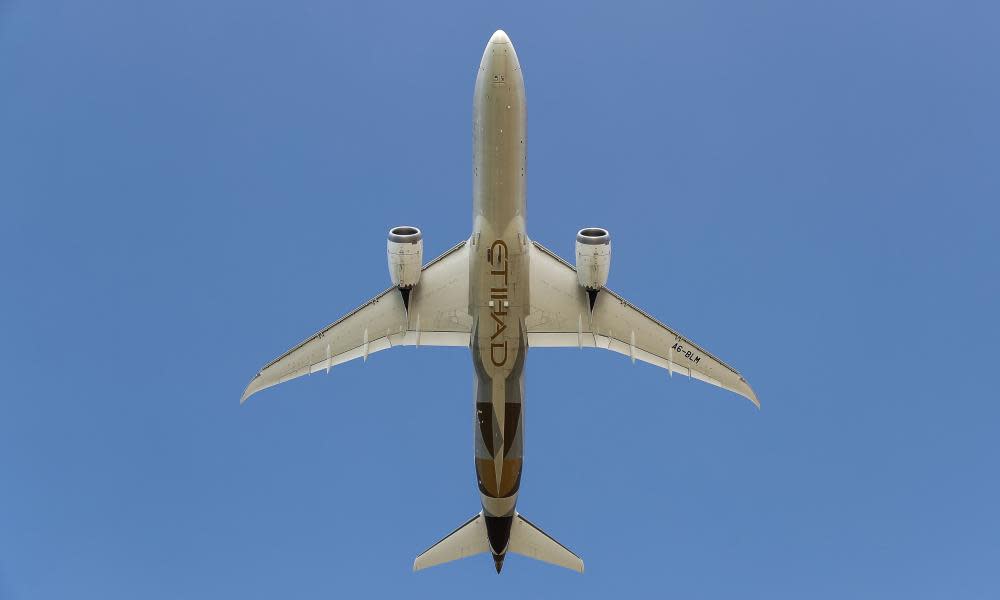Etihad to stop flights to Queensland as Frydenberg says international border closed until late 2021

Etihad Airways will stop all flights to Brisbane because the route is commercially unviable, as Australia continues to limit the number of passengers airlines can bring into the country.
Despite the recent increase in the cap on arrivals from 4,000 to 5,500 passengers per week, Etihad’s decision to pull out of its Abu Dhabi to Brisbane route for commercial reasons follows Malaysia Airlines’ decision in September to halt flights to Brisbane, Perth and Adelaide in light of the introduction of the arrival caps.
On Wednesday, treasurer Josh Frydenberg appeared to suggest Australia’s tough border restrictions will continue to affect international airlines’ operations, as he said the federal budget he handed down on Tuesday relied on assumptions that Australia’s international borders will be closed until “late next year”.
Related: Why are more than 25,000 Australians still stranded overseas, six months into the pandemic?
“International travel, including by tourists and international students, is assumed to remain largely closed off until late next year and then gradually return over time, and a vaccine to be available around the end of 2021 is one of the assumptions in the budget,” Frydenberg told the National Press Club.
Explaining what prompted the flight changes, an Etihad spokesman told Guardian Australia “the decision to cancel the [Abu Dhabi to Brisbane] route is a commercial one, and a direct consequence of the impact of Covid-19 on global travel and tourism demand”.
“We will work closely with impacted guests and travel agents to notify them of the changes to their itineraries and re-accommodate them on alternative flights,” he said.
The spokesman noted Etihad will continue to fly to Sydney and Melbourne, however the latter city has not been accepting any international passengers since the escalation of its second wave of Covid-19.
Related: Morrison government allowing rich foreigners in ahead of 28,000 stranded Australians
Etihad’s decision is likely to create a backlog among its own customers who have been stranded overseas, but will free up space for other airlines who have to share Brisbane’s 1,000 weekly hotel quarantine places for new international arrivals between them.
The arrival caps, which are limits enforced by the commonwealth but initially requested by states to ease pressure on their hotel quarantine systems, have left at least 28,000 Australians stranded overseas, with economy and increasingly business class passengers reporting being repeatedly bumped off their flights home.
As a result of the caps, planes are landing at Australian airports with as a few as 30 passengers and as few as four economy passengers.
Frustrated airlines have acknowledged they are prioritising more expensive tickets to remain profitable under the cap, with Qatar Airways’ chief executive Akbar Al Baker also warning the caps threatened the viability of flying to Australia.
After the flight caps were introduced in July and promptly tightened to about 4,000 arrivals each week, leaders agreed to increase their intakes at a national cabinet meeting in mid September.
Sydney now takes about 2,950 arrivals per week, after increasing its cap by 500, while Queensland also increased its weekly cap to about 1000. Western Australia will next week increase its intake by 500 to about 1,025.
Related: 'Shattered, heartbroken, financially ruined': stranded Australians plead for help
However airlines flying stranded Australians home said the increases didn’t go far enough, and state governments have asked the federal government to either provide personnel or financial support to police more people in hotel quarantine, or to establish commonwealth quarantine facilities to help repatriate Australians stuck overseas.
Australia recently announcement that Australians flying from New Zealand to New South Wales, the Northern Territory or the Australian Capital Territory will be exempt from hotel quarantine, however this is only expected to free up 325 arrival places per week.

 Yahoo News
Yahoo News 
